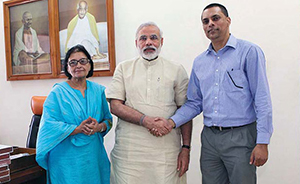The Road Ahead
We have a new Prime Minister and above all we have a new Health Minister, who is a doctor himself. Dr. Harsh Vardhan must be flooded with advice and suggestions from all and sundry about how to run our health system. Not all of them will be good and he will have a tough task separating the proverbial wheat from the chaff. And he will have ideas of his own. It will hence seem right to focus on the root causes of the disease rather than get stuck with superficial symptoms. Any observer of Indian health system very quickly comes up with two conclusions and I will attempt to delineate them here.
Lack of Rural Infrastructure and Urban Overcrowding
Many of the ills of our healthcare can be traced to a complete lack of infrastructure in rural areas and an over-concentration of services in urban areas. Unless, we think about strengthening our rural infrastructure in a massive way, no lasting solution will ever be found to India’s health problems. Yes, we need more doctors and nurses, but with our current facilities, we are not able to retain the ones we produce. We have to understand that doctors and nurses need jobs in adequate facilities when they come out of medical and nursing colleges. If we can’t give them jobs that will pay them decent wages and provide adequate training, they will either be forced to indulge in corrupt practices or migrate abroad. The state of rural India is such that even the students coming from rural parts don’t want to go back and work there and that then leads to an over-concentration in urban areas where doctors, specialists, and hospitals are competing for the attention of a very small number of patients. This then promotes unhealthy competition where they are indulging in all kinds of corrupt practices to attract a flow of “self-paying” patients. The urban public healthcare systems, on the other hand, are dealing with an ever-increasing pool of patients with scarce resources at their disposal.
The only lasting solution of this problem is not easy and likely to entail a massive public private partnership. However it is not beyond the third largest economy in the world and a government that has people’s mandate. I think we need to set up “Health Townships”, in each rural parliamentary constituency of India, which can boast of not only state of the art hospital facilities for the patients but also accommodation, water, and electricity for the staff who work there, quality schools for their children, and shopping malls and entertainment facilities for their families. Such townships will be the only way to attract our healthcare forces into rural India. We have to realize that doctors and nurses are normal human beings with needs not dissimilar to others in the society. If we pay them well and provide them with adequate housing, education, and work place facilities, they will not need to go to cities or abroad. Such townships will have multiple benefits for our society. It will help promote rural development in general and curtain massive urban migration that we are seeing. Needless to say, it will need a sustained effort by all stakeholders that will include central government and its various departments, state governments, and private sector.
An Effective Regulator
The second big problem with our system seems to be that related to the role of Medical Council of India as a regulator. MCI needs to be strengthened and equipped with resources to rebuild reputation as an effective, fair, and robust regulator of the medical profession in the country. A breakdown of trust in the regulator is neither good for the profession nor the patients. We need a regulator, which is trusted and respected by all. It must protect patients above all and support professionals in their duty. In absence of a regulator, more and more patients will be forced to go down the legal path for their grievances. And bringing law into health is not something either patients or doctors would like to see more of. Currently, Medical Council of India has been entrusted with regulating millions of doctors but has neither been empowered to function adequately nor funded. We will have to examine ways of ensuring ways to make Medical Council of India an organization that we can all be truly proud of.
—The author is Chairman, Webmed Limited, Durham, UK











Comments.